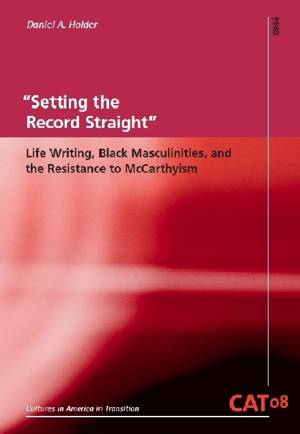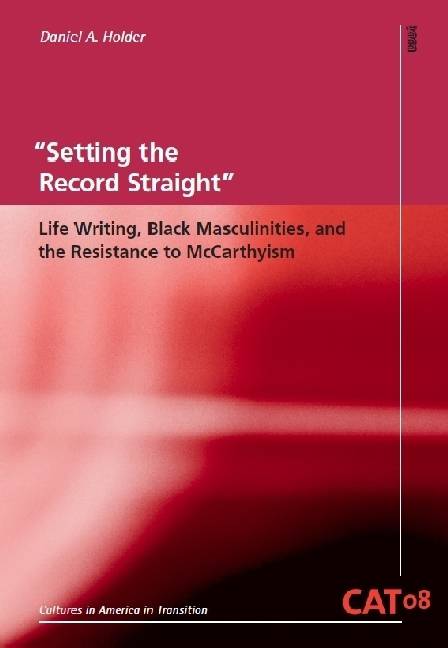
- Afhalen na 1 uur in een winkel met voorraad
- Gratis thuislevering in België vanaf € 30
- Ruim aanbod met 7 miljoen producten
- Afhalen na 1 uur in een winkel met voorraad
- Gratis thuislevering in België vanaf € 30
- Ruim aanbod met 7 miljoen producten
Zoeken
"Setting the Record Straight"
Life Writing, Black Masculinities, and the Resistance to McCarthyism
Daniel A. Holder
€ 41,95
+ 83 punten
Omschrijving
McCarthyism, the anticommunist witch hunt of the late 1940s and 1950s in the US, had dire consequences for the African American civil rights movement. Many black civil rights activists were stigmatized and attacked by their political enemies as "subversive" and "Un-American" whether actual communists or not, thereby effectively removed from public discourse. While the impact of McCarthyism on the black civil rights movement has been amply documented by academic research in historiography and American Studies, the actual responses of many black civil rights activists to McCarthyite accusations lacked a thorough investigation. Setting the Record Straight tackles this academic lacuna and provides the first systematic study that analyzes texts by black civil rights activists produced in response to McCarthyism, such as those by W.E.B. Du Bois, Paul Robeson, Benjamin Davis Jr., Esther Cooper Jackson, Claudia Jones, Pauli Murray, C.L.R. James, or Langston Hughes. Claiming that the cultural logic of McCarthyism cannot be understood without taking its auto/biographical as well as its gendered dimension into account, Setting the Record Straight assesses how constructions of black masculinity and the black male body figured in and shaped black auto/biographical resistance to McCarthyite anticommunism. In doing so, this innovative study brings a host of previously neglected and unpublished primary source material to the center of analytical attention, including not only actual autobiographies but also auto/biographical narration in the context of court testimonies, Congressional Committee hearings, FBI-files, newspaper articles, or pamphlets. Setting the Record Straight thus significantly contributes to an understanding of the place of black life writing in the context of McCarthyism as well as to a broader comprehension of intersectional issues of race, gender, class, Communism, and Americanism/un-Americanism during early US Cold War culture.
Specificaties
Betrokkenen
- Auteur(s):
- Uitgeverij:
Inhoud
- Aantal bladzijden:
- 396
- Taal:
- Engels
- Reeks:
- Reeksnummer:
- nr. 8
Eigenschappen
- Productcode (EAN):
- 9783868215229
- Uitvoering:
- Paperback
- Afmetingen:
- 156 mm x 225 mm
- Gewicht:
- 747 g

Alleen bij Standaard Boekhandel
+ 83 punten op je klantenkaart van Standaard Boekhandel
Beoordelingen
We publiceren alleen reviews die voldoen aan de voorwaarden voor reviews. Bekijk onze voorwaarden voor reviews.











